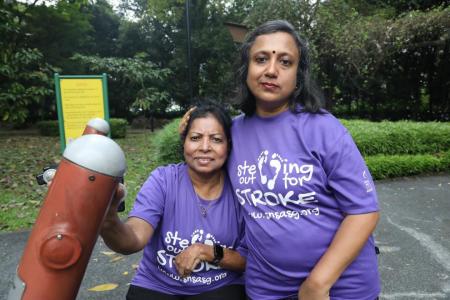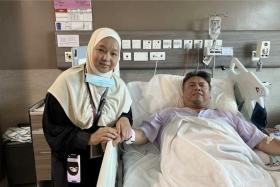Starting life anew after stroke
While training for a 12km marathon in New Delhi seven years ago, former pre-school teacher Suja Padmanabhan, now 51, felt a sharp pain on the back of her head and neck.
She dismissed the symptoms as a mere headache, until the agony intensified and led to her collapsing at home after training. She was rushed to hospital where doctors said she had suffered a stroke.
A stroke occurs when blood flow to a part of the brain stops. If blood flow is cut off for longer than a few seconds, the brain cannot get nutrients and oxygen. The death of brain cells can cause lasting damage.
Ms Suja, who was born and raised in Tamil Nadu and moved to Singapore with her family in 2018, said she could not contain her disbelief as she lay bedridden soon after.
"Only a week before, I had a full-body check-up. I did not have a history of either high blood pressure or cholesterol. No existing medical issues surfaced then," she said.
After using a wheelchair for four months, Ms Suja started walking with the aid of a set of ankle foot orthoses and sometimes a crutch. She has, however, lost the use of her left hand.
A similar fate befell 69-year-old Kogilam Hannah, who at the age of 31, was pregnant for the first time.
The then admin assistant suffered a stroke following complications from the pregnancy, which resulted in a miscarriage.
"A blood vessel ruptured, and I was in a coma for 10 days," said the wheelchair user.
What truly hurt, she added, was that she could not risk getting pregnant again.
When she suggested trying for a child again, her husband refused, saying that it could endanger her life. "He said that if we feel like we need a child, we can always adopt."
Both women cite their husbands as pivotal pillars of support throughout their ordeal-and the painful and long recovery process.
Ms Hannah, a Singaporean who grew up in Naval Base estate, met her husband, an engineer from Kerala, in 1982.
"My friends had warned me that a husband from India would be very conservative, even oppressive. But he turned out to be nothing like that," she said.
Ms Suja also counts on her 26-year-old daughter for emotional and physical support. "I have been in and out of depression several times. It is only through willpower that I remind myself to live life
the best way I can," she said.
Aside from their family members, the two women's support system comprises a network of medical professionals from the Singapore National Stroke Associations (SNSA), who advise
stroke patients on their exercise and diet.
Dr Shamala Thilarajah, principal physiotherapist at Singapore General Hospital and clinical therapist for stroke and neurological rehabilitation, told Tabla! that many stroke survivors
feel they have lost their independence after a stroke attack, and believe that "their life is over".
According to the Singapore Stroke Registry's most recent annual report in 2021, the number of stroke episodes increased from 6,143 in 2011 to 9,680 in 2021. The median age at onset of stroke increased slightly from 68.0 years in 2011 to 69.8 years in 2021.
Dr Shamala pointed out that about one in three patients experience anxiety or depression.
"There are many who are just going through life, trying to build their resilience after a stroke. They
may not be formally diagnosed with depression or anxiety, and they may not need medications, but what they need is support, perhaps some level of counselling," she said
To that end, stroke survivors can turn to the SNSA's befriending programme.
"Many of our patients have benefited from the befriending programme, where we pair a stroke survivor with another. I think it's important that you talk to somebody who's gone through a similar experience, so you can share," Dr Shamala said.
Get The New Paper on your phone with the free TNP app. Download from the Apple App Store or Google Play Store now



